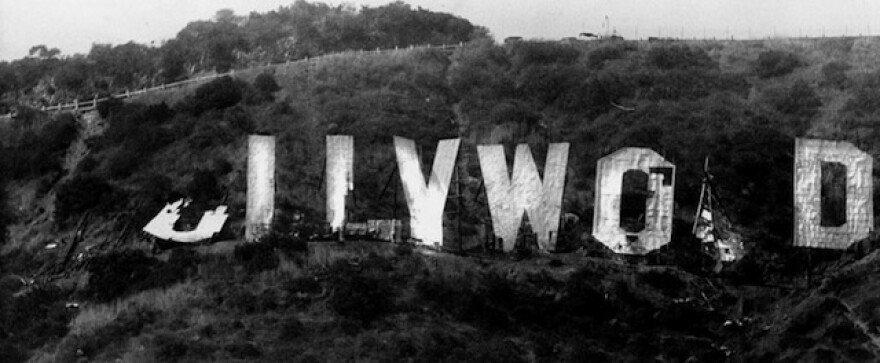|

Hollywood Sign: 1978
Today's selection -- from Oscar Wars: A History of Hollywood in Gold, Sweat, and Tears by Michael Schulman. Movie attendance peaked at 78.2 million a week in 1946, but had declined to a mere 15.8 million by 1971:
“On April 14, 1969, a tuxedoed Gregory Peck strode across the empty lobby of the Dorothy Chandler Pavilion like a weary cowboy crossing abandoned prairie. Peck had become Academy president two years earlier, and his job was to introduce the Forty-First Academy Awards. On camera, Peck descended a mirrored staircase in the atrium, looked around with his thick eyebrows furrowed, and pronounced in his deep, godlike voice, ‘It's kind of lonesome out here. The audience is already on the inside.’
“The cameras cut to the stage, where Frank Sinatra crooned the title song from Star!, a new Julie Andrews vehicle from 20th Century-Fox. The most nominated films that year were the splashy studio musicals Oliver! and Funny Girl, whose star, Barbra Streisand, showed up to the ceremony in a see-through pantsuit. Streisand was a new kind of old star—’ethnic,’ but with showbiz chops. In an effort to make the Oscar broadcast less lugubrious, Peck had hired stage director Gower Champion. In place of Bob Hope, hosting duties were shared by ‘Oscar's best friends,’ among them Ingrid Bergman, Sidney Poitier, Burt Lancaster, and, for the youth vote, Jane Fonda, her short hair marcelled for They Shoot Horses, Don't They?
“When Bergman opened the Best Actress envelope, she found a shocker: Streisand had tied with Katharine Hepburn, for The Lion in Winter. Because Hepburn was absent, Streisand, who was ten days away from twenty-seven, had no chance of being upstaged. She cooed to her statuette, ‘Hello, gorgeous.’ Oliver! won five awards, including Best Picture. Only six months earlier, the MPAA had instituted a new rating system, replacing the old Production Code after three and a half decades. Oliver! was rated G, designating it as the kind of wholesome studio entertainment that could be enjoyed by ‘general audiences,’ whoever that was.
 |
| Peck in 1948 |
“But a closer look revealed another Hollywood—and a more unconventional kind of movie—clawing at the gates. Rosemary's Baby was nominated only for Roman Polanski's screenplay and for Ruth Gordon, who won Best Supporting Actress. Stanley Kubrick's 2001: A Space Odyssey had managed four nominations, Best Picture not among them, and won for special effects—the only Oscar that Kubrick would ever receive. And sitting next to Streisand was her estranged husband, the little-known Elliott Gould, wearing the droopy mustache he had grown for Robert Altman's M*A*S*H.
“After the awards, congratulations on a smashing show poured into Peck's Academy mailbox. ‘At a time when the morals within movies are being pushed to the outer edges of chaos,’ Vincent Canby wrote in the New York Times, awards for the likes of Oliver! ‘reassure everyone in the industry that all is well, that Hollywood really isn't some giant bordello that's about to be raided.’
“He spoke too soon. Just a year later, Gould would be nominated for a movie about spouse swapping, Fonda would hold up a fist on the red carpet, hippie frocks would turn the Oscar stage psychedelic, and the winning picture would be rated X.
“Beneath the gilded schmaltz, Hollywood was falling apart. Movie attendance, which had peaked at 78.2 million a week in 1946, was on a downward slide that would bottom out at 15.8 million by 1971. The old studios, desperate to distinguish themselves from television, had spent the decade filling screens with musical extravaganzas and Spartacus-like words-and-sandals epics that displayed the industry's bloat, but they had little idea how to speak to anyone younger than Streisand. Star! Would lose $15 million and all seven of its nominations, hammering another nail into the coffin of Hollywood's business model since 1965: re-create the success of The Sound of Music. Popular music didn't sound like Oliver! anymore. Vietnam had marred the innocence of Doctor Dolittle. The sixties were almost over, and Hollywood still hadn't caught up.
“Despite a wave of corporate takeovers, the last of the golden age moguls held the studios in an arthritic fist. In 1966, Jack Warner, at seventy-four, had sold his controlling interest in Warner Bros. to Seven Arts Productions—but he ran the studio until late 1969. Daryl Zanuck,
in his late sixties, remained on the throne of 20th Century-Fox, having installed his son, Dick Zanuck, as head of production in 1962. At Paramount, newly acquired by Gulf and Western, Adolph Zukor, in his nineties, and Barney Balaban, in his eighties, sat on the board, which Zukor would chair until his death in 1976 at the age of 103.”
|
|
|
author: Michael Schulman |
|
|
title: Oscar Wars: A History of Hollywood in Gold, Sweat, and Tears
|
|
|
publisher: Harper |
|
| date: |
|
|
page(s): 223-225 |
|